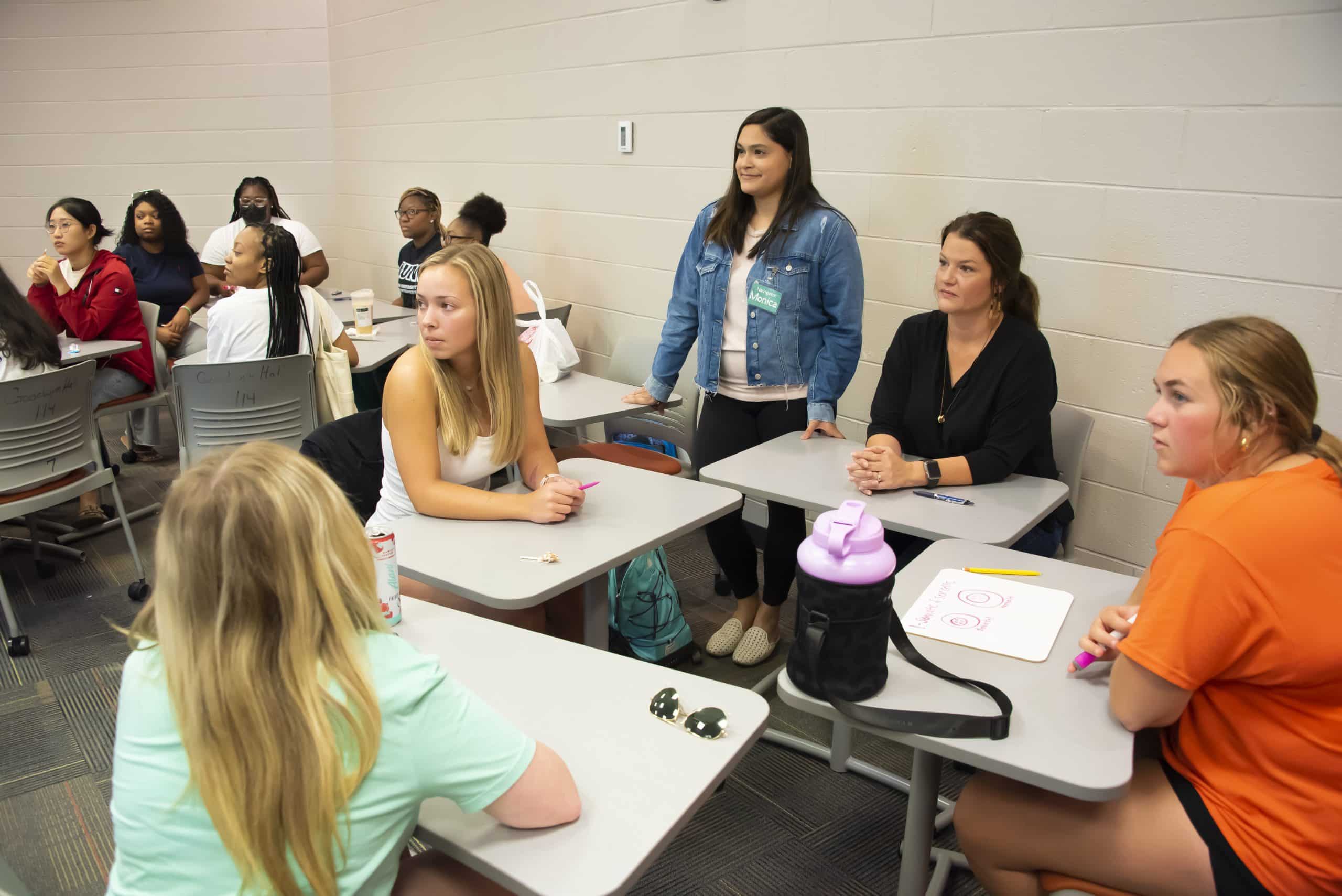Cleared for takeoff: Upperclassmen empower peers through AUM’s Flight School mentoring program

Auburn University at Montgomery’s newly launched Flight School peer mentoring program has given Monica Workman and other upperclassmen the opportunity to team up with professors to provide better support and mentorship to underclassmen during the Fall 2022 semester.

“I’m really enjoying working with my peers through the Flight School program,” said Workman, a senior and second-degree student majoring in pre-nursing. “I find that it aids the student and is beneficial to helping me. It helps to teach me the course materials and continue to retain what I’ve learned.”
Workman is one of about 20 upperclassmen chosen to serve as a peer mentor for Fall 2022 in Flight School, a tiered mentoring program created by AUM faculty to ensure the success of underclassmen in science, technology, engineering and math (STEM) courses. The Flight School program is supported by a $300,000 National Science Foundation Improving Undergraduate STEM Education (IUSE) Grant, said Chelsea Ward, chair of AUM’s Department of Biology and principal investigator of the grant.
“We proposed this new model of tiered mentoring to train our upperclassmen to be leaders in the classroom while helping our underclassmen be better learners,” said Ward, who is joined on the grant with co-principal investigators Tara Beziat, associate professor of curriculum, instruction and technology; Flor Breitman, assistant professor of biology; and Matthew Grilliot, associate professor of biology.
In the program, about four upperclassmen are placed in a classroom as peer mentors to facilitate learning. Peer mentors are assigned as “co-pilots” and “navigators” in the program and work with the lead of professors, Breitman said.
“We are a team,” she said. “While the grant supports for one co-pilot and three navigators, most classes have one co-pilot and two-navigators. It kind of depends on how many students are in the class and how many students are enrolled to be navigators or co-pilots.”

The first cohort of upperclassmen — sophomores, juniors and seniors — were trained this summer and assigned to course sections BIOL 1010, BIOL 1020, and A and P for the fall semester, Ward said.
“Each navigator is matched with a team of four to seven learners who they work with all semester,” she said. “Their role is to facilitate group work, help students engage in class activities, give advice and feedback on engagement and study skills, and generally help students navigate the in-class experience. After serving as navigators, juniors and seniors have the opportunity to be hired as course co-pilots.”
Co-pilots in the program serve as supplemental instructors and are trained to assist in communicating content, facilitating group work and teaching success strategies to learners.
“By working directly with faculty, co-pilots and navigators help to keep faculty informed about the content and delivery of the course, which also empowers them to help shape the syllabus and course design,” Ward said. “As students’ needs change, we hope that our mentors will enlighten faculty and help with continual improvement of the course.”
Workman, who is one of two navigators in Grilliot’s Anatomy & Physiology I class this fall, said the ultimate goal is for co-pilots and navigators to establish trust with their peers.
“As a navigator and peer mentor, I see myself helping to bridge the gap between the student and professor while getting the student comfortable with asking questions and being active participants in lectures,” she said. “I’m also building community with the professors who are using this grant.”

In his Anatomy & Physiology I class, Grilliot allows students to form groups to discuss and receive feedback on his lecture from navigators and the co-pilot in the classroom. Once Grilliot gives an assignment, it is the navigators’ and co-pilot’s responsibility to make sure students are connecting with his lecture, Workman said.
“It’s a huge challenge to get students to want to come in to talk to us and learn that we’re a good resource for them in class,” she said. “It’s a constant area that we are working on.”
Sophomore Christopher Webb, a biology major, said participating in the Flight School program has its advantages for upperclassmen as well.
“The program is helping me to gain more personal confidence and be more comfortable in areas that I may usually be uncomfortable,” said Webb, who plans to continue his education in veterinary school. “I also got involved with the Flight School program because I served as a peer mentor on campus in the spring and wanted to continue being a peer mentor. I’m glad I did. The experience and support from students and faculty alike has been fantastic.”
For Mikayla Layton, who is a first-generation college student and U.S. Air Force reservist, the Flight School program is an opportunity to give back in an area that once served her as an underclassman.

“When I was an underclassman, I had a peer mentor,” said Layton, who is a navigator in Grilliot’s class. “This is a tough subject. I had a mentor when I took a genetics class as an underclassman and because of that mentor, I was able to pass the class. She inspired me to do it.”
Layton, a double major in biology and chemistry, said she in inspired by the work that navigators and co-pilots are doing to build the bridge to knowledge for underclassmen.
“I hope to help my peers do better and succeed in Dr. Grilliot’s course,” she said. “If I can do that for others, especially being a minority in a STEM field, then it will be very rewarding.”
Become a Flight School peer mentor
AUM’s Flight School program will be recruiting peer mentors for the next two years. Students must have a grade of C or higher in the classes they select to navigate (BIOL 1010, BIOL 1011, BIOL 1020, and BIOL 2110). To apply to the program, contact Dr. Flor Breitman at [email protected].
